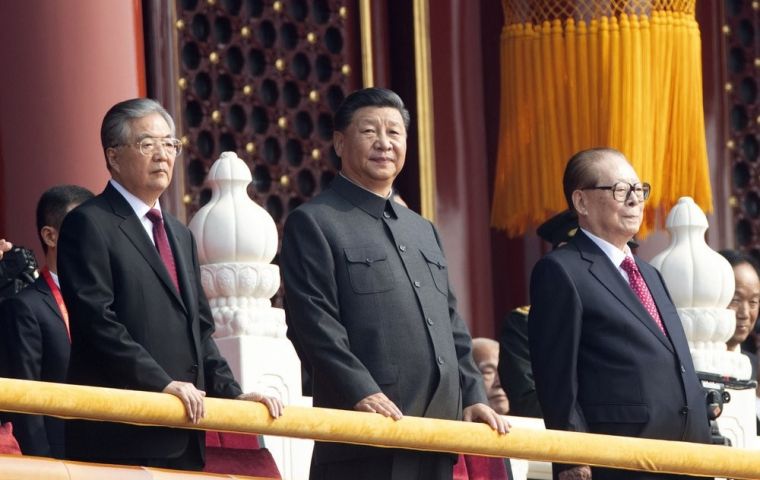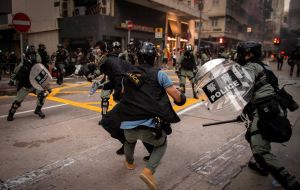MercoPress. South Atlantic News Agency
China displays its military muscle with an impressive parade on the 70th anniversary of the communist revolution
 Xi, dressed in a slate grey “Mao” suit and accompanied by his predecessors Hu Jintao and Jiang Zemin, said China would pursue a mutually beneficial strategy of opening up
Xi, dressed in a slate grey “Mao” suit and accompanied by his predecessors Hu Jintao and Jiang Zemin, said China would pursue a mutually beneficial strategy of opening up  The event comes in the face of mounting challenges, including nearly four months of anti-government protests in Hong Kong and an economy-sapping trade war with the United States.
The event comes in the face of mounting challenges, including nearly four months of anti-government protests in Hong Kong and an economy-sapping trade war with the United States. China celebrated its growing power and confidence with a big display of military hardware and goose-stepping troops in Beijing on Tuesday, overseen by President Xi Jinping, who pledged peaceful development on Communist China’s 70th birthday.
The event is the country’s most important of the year as it looks to project its assurance in the face of mounting challenges, including nearly four months of anti-government protests in Hong Kong and an economy-sapping trade war with the United States.
Xi, dressed in a slate grey “Mao” suit and accompanied by his predecessors Hu Jintao and Jiang Zemin, said China would pursue a mutually beneficial strategy of opening up.
The military should resolutely safeguard China’s sovereignty, security and development interests, and firmly uphold world peace, Xi told a handpicked crowd at Tiananmen Square, in comments carried live on state television.
“No force can ever shake the status of China, or stop the Chinese people and nation from marching forward,” Xi said from the Gate of Heavenly Peace, where Mao Zedong proclaimed the founding of the People’s Republic of China on this day in 1949.
China must maintain lasting prosperity and stability in Hong Kong and Macao, promote the peaceful development of relations with self-ruled Taiwan and “continue to strive for the motherland’s complete reunification”, he added.
Xi, whose military modernization program has rattled nerves around the region, then inspected row upon row of military hardware and immaculately presented troops.
At one stage, Xi, riding past troops in a black, open-roofed limousine, shouted: “Hello comrades, hard-working comrades!”
The massed ranks bellowed back: “Follow the Party! Fight to win! Forge exemplary conduct!”
Returning to the stage, Xi watched as lines of tanks, drones and missiles filed past.
Among the weapons on display were DF-41 intercontinental ballistic missiles, the backbone of China’s nuclear deterrence, which can carry several nuclear warheads and reach as far as the United States.
“They have highly advanced capabilities and the range to reach the United States from mainland China,” said Nozomu Yoshitomi, professor at Japan’s Nihon University and a retired major general of Japan’s Ground Self-Defense Force.
“Also, this is probably the first time they have shown us JL-2 submarine-launched ballistic missiles in a parade. They don’t have the range to reach the United States from waters around China, but they demonstrate China’s second-strike capability.”
In Washington, a senior Pentagon official said the parade appeared to be largely in line with expectations.
“We’ll do the post-game analysis on it but I think it is in line with expectations,” said Randall Schriver, who leads Asia policy at the U.S. Defence Department.
After the military parade, dancers and floats lauding China’s history, achievements and its regions passed by, along with portraits of China’s previous leaders and Xi himself, which drew loud cheers.
The upheavals of the last seven decades — including the Great Leap Forward, the Cultural Revolution and bloody crackdown on pro-democracy demonstrators at Tiananmen Square in 1989 - did not get a mention.
The more than two-hour parade of 15,000 soldiers, 70 floats and 100,000 civilians was a proud moment for many citizens, watching the spectacle across the country on television.
Xi remains broadly popular in China for his aggressive campaign against corruption and for propelling what is now the world’s second-biggest economy to the forefront of global politics.
But he faces mounting challenges, notably in Hong Kong, which has been rocked by protests demanding greater democracy.
Another challenge is Chinese-claimed Taiwan, a free-wheeling democracy with little interest in being run by Beijing and which holds presidential elections in January.
Taiwan on Tuesday condemned China’s “dictatorship”, saying it was a threat to peace.




Top Comments
Disclaimer & comment rulesCommenting for this story is now closed.
If you have a Facebook account, become a fan and comment on our Facebook Page!